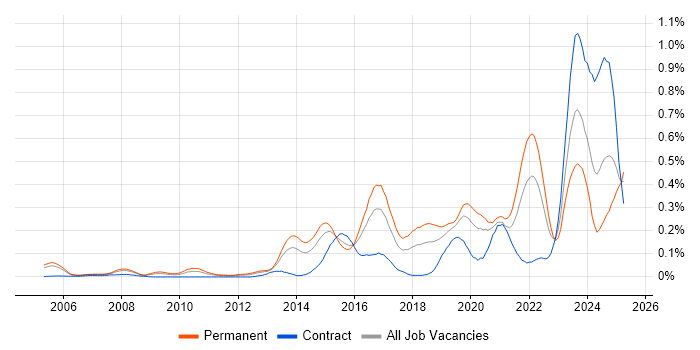Secure Code Development
South East > Thames Valley
The table below provides summary statistics for permanent job vacancies advertised in the Thames Valley requiring Secure Coding skills. It includes a benchmarking guide to the annual salaries offered in vacancies that cited Secure Coding over the 6 months leading up to 1 May 2025, comparing them to the same period in the previous two years.
| 6 months to 1 May 2025 |
Same period 2024 | Same period 2023 | |
|---|---|---|---|
| Rank | 165 | 240 | 254 |
| Rank change year-on-year | +75 | +14 | -28 |
| Permanent jobs citing Secure Coding | 13 | 13 | 6 |
| As % of all permanent jobs advertised in the Thames Valley | 0.43% | 0.19% | 0.098% |
| As % of the Processes & Methodologies category | 0.46% | 0.23% | 0.10% |
| Number of salaries quoted | 10 | 2 | 0 |
| 10th Percentile | - | £70,500 | - |
| 25th Percentile | £52,500 | £78,750 | - |
| Median annual salary (50th Percentile) | £55,000 | £95,000 | - |
| Median % change year-on-year | -42.11% | - | - |
| 75th Percentile | £57,500 | £108,750 | - |
| 90th Percentile | £63,500 | £115,500 | - |
| South East median annual salary | £55,000 | £70,000 | £62,500 |
| % change year-on-year | -21.43% | +12.00% | -26.47% |
All Process and Methodology Skills
Thames Valley
Secure Coding falls under the Processes and Methodologies category. For comparison with the information above, the following table provides summary statistics for all permanent job vacancies requiring process or methodology skills in the Thames Valley.
| Permanent vacancies with a requirement for process or methodology skills | 2,830 | 5,747 | 5,804 |
| As % of all permanent jobs advertised in the Thames Valley | 93.09% | 85.19% | 94.70% |
| Number of salaries quoted | 1,225 | 4,024 | 3,153 |
| 10th Percentile | £29,000 | £29,000 | £29,750 |
| 25th Percentile | £39,750 | £38,000 | £38,750 |
| Median annual salary (50th Percentile) | £57,500 | £50,000 | £55,000 |
| Median % change year-on-year | +15.00% | -9.09% | - |
| 75th Percentile | £73,750 | £65,000 | £72,500 |
| 90th Percentile | £87,500 | £80,000 | £87,500 |
| South East median annual salary | £55,000 | £50,000 | £55,000 |
| % change year-on-year | +10.00% | -9.09% | - |
Secure Coding
Job Vacancy Trend in the Thames Valley
Job postings citing Secure Coding as a proportion of all IT jobs advertised in the Thames Valley.

Secure Coding
Salary Trend in the Thames Valley
3-month moving average salary quoted in jobs citing Secure Coding in the Thames Valley.
Secure Coding
Salary Histogram in the Thames Valley
Salary distribution for jobs citing Secure Coding in the Thames Valley over the 6 months to 1 May 2025.
Secure Coding
Job Locations in the Thames Valley
The table below looks at the demand and provides a guide to the median salaries quoted in IT jobs citing Secure Coding within the Thames Valley region over the 6 months to 1 May 2025. The 'Rank Change' column provides an indication of the change in demand within each location based on the same 6 month period last year.
| Location | Rank Change on Same Period Last Year |
Matching Permanent IT Job Ads |
Median Salary Past 6 Months |
Median Salary % Change on Same Period Last Year |
Live Jobs |
|---|---|---|---|---|---|
| Oxfordshire | - | 11 | £55,000 | - | 6 |
| Berkshire | +43 | 1 | - | - | 6 |
| Buckinghamshire | - | 1 | - | - | 6 |
| Secure Coding South East |
|||||
Secure Coding
Co-occurring Skills and Capabilities in the Thames Valley by Category
The follow tables expand on the table above by listing co-occurrences grouped by category. The same employment type, locality and period is covered with up to 20 co-occurrences shown in each of the following categories:
